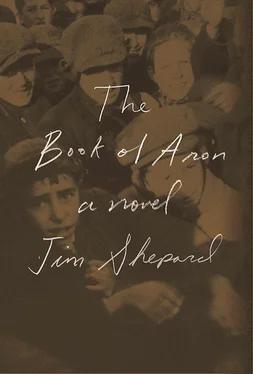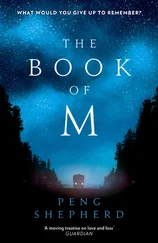Adina looked at me and my expression told her I’d had no idea that my mother was going to do this.
“I don’t think the girls want to see children’s puppet shows,” I said to my mother.
“They’re not puppet shows,” she said.
“I saw their parade when they had to move into the ghetto,” Zofia told her. “It was quite the circus.”
“I saw that too,” I said. “Did you see the wagons with the geraniums?”
Zofia said that she’d heard all sorts of rumors about him: he’d been taken into the forest and shot; he’d been taken away to one of the camps; he’d been put on a boat to Palestine. The problem had been that he’d gone all the way to the Gestapo to protest the confiscation of some potatoes and showed up there having refused to wear his armband. It turned out that he’d been beaten and thrown into a cell but then after a month they’d let him go.
“They let him go?” Adina asked, interested in that part. “Why?”
Zofia held her hand up and rubbed her thumb against her fingertips.
“Is he rich?” Adina asked.
“He has rich friends,” Zofia told her. She said she’d also heard that his Polish janitor had been beaten almost to death on the same day because he’d applied in person to go into the ghetto with the rest of the orphanage but Aryans could no longer work for Jews.
The four of us listened to the conversations at other tables. I could see my mother’s disappointment in her eyes. “Working and stealing, working and stealing, that’s what times are like now,” she said. The girls just looked at her and finished their tea. Zofia kept the sugar cube pressed between her lips and her tongue poked out only once it had completely dissolved. My mother stood up and wiped her eyes. Well, she told us, if we were interested, the new orphanage was now on Chłodna Street, in the small ghetto.
“We’ll go,” Zofia said. “Sure. It could be fun.” Adina looked at her. “It could be fun,” Zofia repeated.
My mother was pleased and left before we could change our minds. Adina said, “You’re not going to get Lutek and Boris to agree,” and Zofia said, “I’m not going to try.”
That night at dinner my mother told everyone the good news and Boris’s father wanted to know why the Germans would let Korczak go.
“Maybe they made him an informer,” Boris said.
“Maybe he gave them a pile of gold,” my brother said.
“The Germans know him as the greatest child specialist and educational reformer in all of Europe,” my father said. “They know him even in England and France. He’s probably the safest Jew in the ghetto.”
“A big shot,” Boris said.
“Was he the one with the scandal before the war?” Boris’s father asked.
“What scandal?” my mother asked. Boris’s father held up his hands like he meant no offense.
“He lost his radio program and his position on the juvenile court,” my father said. “He went on a trip to Palestine and then people no longer overlooked that Janusz Korczak the Pole was really Henryk Goldszmit the Jew.”
Shots were fired outside and we all were quiet around the table, listening. The soup was beet shavings and nettle leaves with little lumps of kasha.
“No one wanted a Jew in charge of Poland’s juvenile offenders,” my father added. But I was still thinking about why the Germans would let Korczak go and everyone else had gone on to thinking about other things.
AT THE ORPHANAGE A LINE HAD BEEN PAINTED through the sign for the Roesler Commercial Secondary School and a handmade wooden sign that said The Children’s Republic hung below it from twine. We were escorted into the building and to wooden folding chairs in front of the stage by little girls in costumes made of bits of paper and other scraps. “What are you supposed to be?” I asked the girl leading me in. Her paper was mostly colored green and she said, “I’m a dragon.”
The stage was a platform at the end of the main room on the first floor. Once all of the chairs were filled and people lined the back wall, the heavy woman I’d seen the Old Doctor pulling down the street came through a door in the back and everyone applauded. She was carrying a cactus that she set down on the front of the stage. She welcomed everyone to the Orphans’ Home and said her name was Stefania Wilczyńska and that she was the senior teacher. She introduced the cactus as her favorite orphan and the home’s good-luck charm, and everyone laughed as though they knew what she was talking about. Then she said it was her pleasure to introduce the greatest humanist and intellectual in Poland.
Everyone applauded again and Korczak came through the same door. He was wearing a paper crown, and people laughed at that. The heavy woman took a seat in the front row.
“Someone should give that fat man in the back a chair,” Korczak said. “He looks much too well-to-do to stand.” The smaller children in the audience thought he was hilarious.
“Everyone loves my rude remarks,” he said once they quieted down. “Even the dressed-up ladies and elegant gentlemen. Though they keep their distance and I never hear from them until their children are sick. Then it’s: ‘Please, please, you have to come,’ even if it’s the middle of the night.”
“So he’s a doctor?” Adina whispered to my mother.
My mother told her he was a famous doctor and he’d been an army doctor in the war between Russia and Japan and in the world war, and in the civil war in Russia.
He apologized to what he called the better society in the crowd for his occasional use of Yiddish. He said he would like to present one of his radio talks, called The Loneliness of the Child , before standing aside for the main event of the evening, the home’s production that would showcase the most talented undersized citizens who had been gathered from Warsaw’s attics and basements. “That’s where you find some of the city’s most interesting people,” he said. “Forgotten, in someone’s basement.” He cleared his throat and cleaned his glasses with a handkerchief, taking his time. Then he put his glasses back on and began.
It was funny at first but then got sadder. I stopped listening.
When it was over everyone applauded again and the children set up the stage for the play.
“I liked when he said that loneliness was the port from which he always sets out,” Zofia said.
“I liked when he asked, ‘Do you steer the course or are you just carried along?’ ” my mother said.
“I’m not just carried along,” Adina said.
“You sound like Boris,” Zofia said.
The play was called The Three Journeys of Hershkele . The hero, who wore a headdress he could barely keep on his head and that was never explained, hid on a plane bound for England, where he talked the English king into allowing all the Jews to emigrate to Palestine. Then he hid on a plane to Egypt, where he found a whole roomful of the pharoah’s gold to pay for everyone’s trip. Then he hid on a plane to Germany, where he met with Hitler. The boy who played Hitler was very good. When he saw all the gold Hitler was sorry for what he’d done and invited the Jews back, and the hero told him no thanks but said he’d use the leftover gold to buy milk and butter for the starving German children. At the end just the hero and Hitler remained onstage and Hitler thanked him and asked if there was anything he could do in return for the milk and butter and the hero said yes, that Hitler could make a law that all adults who pass children on the street must bend their heads in shame, and Hitler said that he would. Then the hero sang a song about the Ten Commandments and the whole cast did a dance and the thing was over.
My mother applauded even after everyone else had stopped. She was weeping again. “You liked it too,” she said to me. Korczak came back out to thank the cast of the play and everyone applauded again. He thanked everyone for coming, and congratulated them all on being twice orphaned themselves, since they were stateless and Jewish. He told the adults to remember to approach children with affection for what they already were and with respect for what they could become. He told the children to remember that we couldn’t leave the world the way we found it. And to remember to wash our hands. And to drink boiled water. And to open the windows to get fresh air. He looked out the window closest to him and finished by saying that we should wait until it was warmer, though.
Читать дальше












